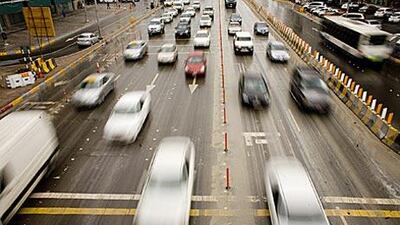I am not a car person. Never have been. The last vehicle I owned was a 1995 Chevrolet extended-cab pickup that I bought in Texas and sold several years later when I moved to New York, where my commute was a daily pilgrimage amid malcontents, perverts, and simple fellow travellers. That is, I rode the subway. But now, of course, that is not an option. In Abu Dhabi, as in the UAE as a whole, the car is king.
You have not truly arrived until you've looked in your rearview mirror and seen only the grille of a massive SUV, lights blinking frantically as if the driver was trying to send you an emergency message in Morse code. While there is in fact no code, the message is unambiguous - pull over into the slow lane or I will squash you into the sand. The question - for a miserly sort like me anyway - is how to get around safely and quickly without blowing the budget in the process.
For the first month, my wife and I learnt our way around the city in a rented Nissan Tiida, an economical yet sporty number that seems to rival BMWs and Mercedes on the streets in terms of sheer numbers. (Quick aside from a newly-arrived American: for those who wonder why the US car industry is in such a shambles, notice that Fords and Chevrolets are about as common on the streets as flash floods).
One reason for the Tiida's popularity, we soon discovered, is that its small size enabled us to squeeze into a number of parking places around Abu Dhabi that can best be described as quasi-legal. Still, the monthly rental rate for a Tiida was Dh2,000 and we assumed we could find a better long-term deal elsewhere. However, most local agencies do not offer long-term leases. We were told to drive out to the airport, to the temporary building where the global franchises have been set up for the time being. The best offer we got, after ploughing through the language barrier to explain what we wanted, was Dh2,135 a month - more expensive than renting, even if it came with full insurance. We retained the option to buy the car at the end of the lease, but the agent insisted he could not tell us how the sales price would be calculated.
The best value on a monthly cash-flow basis is to buy a car outright. But given the uncertainty in the economy, the idea of committing to a four- or five-year loan seems less than pragmatic for expats like ourselves. The salesman at Al Masaood Automobiles in Abu Dhabi showed us a 2010 Tiida four-door for Dh50,000 (he insisted it was a "special price" just for us, so the same deal may not be available for customers deemed less special).
Unlike in the US, the dealership does not actually arrange the financing itself. However, our salesman called my bank and promised to grease the wheels. Sure enough, after a few moments of genial conversation the salesman handed me the telephone so that I could speak directly with a loan officer. For a two-year loan, the interest rate was 4.5 per cent, or 3.99 per cent if we agreed to install the tinting package offered by the bank for Dh750. Why the bank is selling a tinting package is a mystery to me, but the higher interest rate still offered a lower monthly payment because of the additional tinting fees.
I could lower my monthly payment by almost Dh600 by extending the loan to three years. However, I would pay an extra Dh1,200 in interest charges over the life of the loan. Paying it off early isn't an attractive option either, because the bank charges a penalty of 5 per cent of the remaining balance. We concluded that the best option for us was a two-year loan with a monthly payment of around Dh2,270. The upside is that at the end of two years we would own it outright and be able to sell it should we leave the UAE,or simply upgrade to something nicer. The downside is that what we would own would be a two-year-old budget car displaying all of the considerable wear and tear that comes from driving in the sand and withering heat.
What would we realistically be able to get for it? It was a dilemma. In a fit of desperation, I called an agency that rents cars for Dh10 per day. The vehicles are blanketed with advertisements for products like non-alcoholic malt beverages and breakfast cereals. I concluded the monetary savings would not cover the damages to my dignity. The final option was to pick up a used car from an expat on his or her way out of the country. I didn't fancy that idea either as I feared the abuse the vehicle had most likely endured.
As luck would have it, a friend confided to me that he would be returning home soon and would consider all reasonable offers for his two-year-old Mazda. I borrowed it for a couple of days and grew to feel comfortable in it, even as I employed it in my car-shopping expeditions around town. Sure, it was a bit beat up, but it would more than suffice. My wife and I decided, as we left the Nissan dealership, that we would make our friend an offer once we determined the prices dealers were asking for comparable cars. We would take our chances that it would last at least a couple of more years in the Abu Dhabi heat.
When we reached our wheels, parked just behind Spinneys, we were greeted with yet another cost of owning a car - a parking ticket, flapping in the breeze on the windscreen. breagan@thenational.ae

